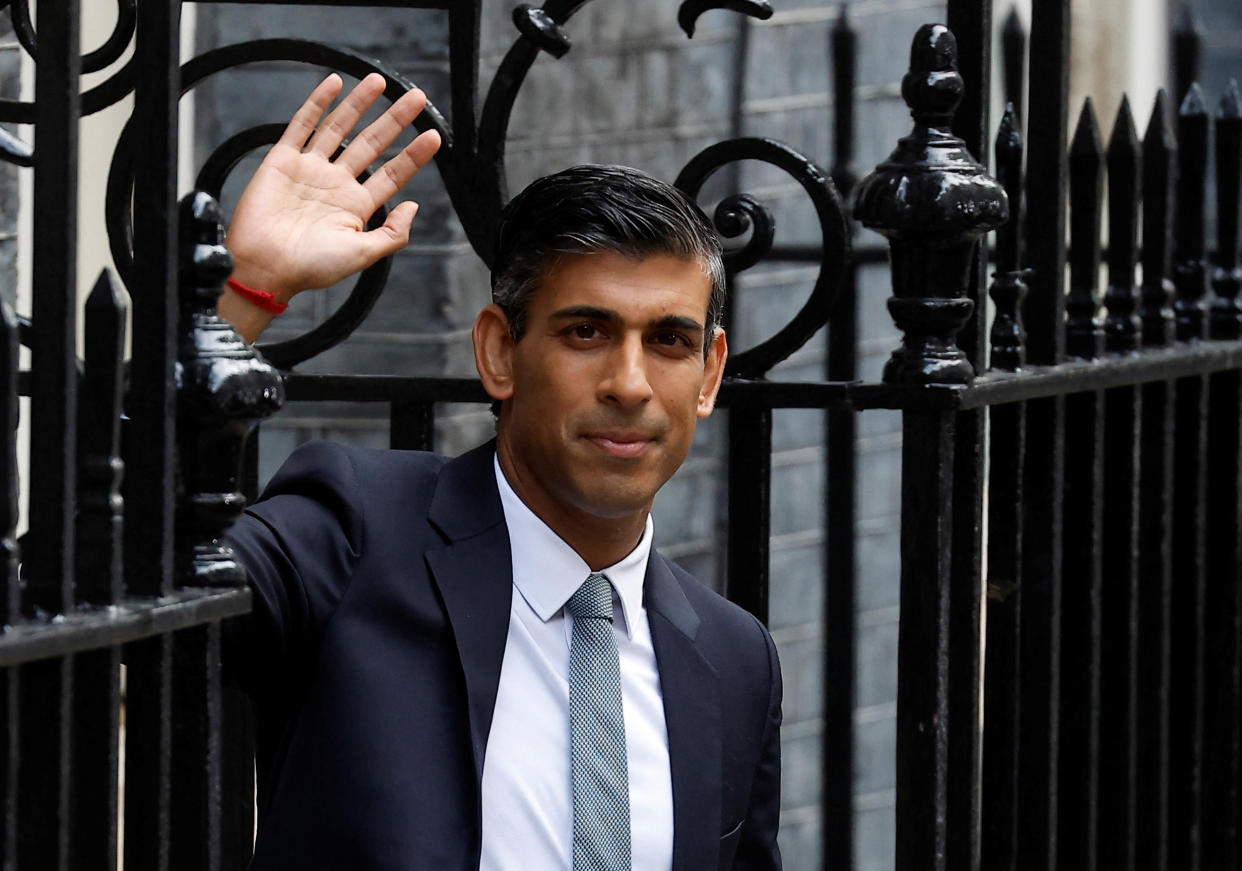UK Prime Minister Rishi Sunak 'a beacon of stability for the markets,’ strategist says
This week, former British Finance Minister Rishi Sunak was appointed as the next prime minister of the U.K. and head of the Conservative Party at a time of historic political and economic turmoil for the country.
Sunak will replace Liz Truss, who served just 44 days in office before resigning on Oct. 20 amid widespread criticism as the country grapples with an unprecedented economic downturn.
“Rishi Sunak being now the prime minister is at least a beacon of stability for the markets because he will follow new austerity, and he will follow a more balanced budget, and more real fiscal discipline," Ben Emons, director of Medley Global Advisors, told Yahoo Finance Live (video above). "The tail risk of what we experienced with Elizabeth Truss is out of the way now, and the next step here is to try and get a control over the economy, which... is really in dire straits."
The U.K. economy's journey to instability began soon after the Brexit referendum in 2016, when the British public voted to leave the European Union (EU).
The downturn in the markets also led to the current recession in the U.K. Between March and April 2022, inflation in the U.K. paralleled higher prices seen in the U.S., but by June 2022, the U.K.’s inflation rate surpassed that of the U.S.
More recently, a devastating energy crisis and a sinking British pound have contributed to the resignations of numerous cabinet ministers along with Truss.
Sunak is now the fourth prime minister to lead the U.K. since David Cameron's resignation in 2016 following the Brexit vote.
Public sentiment
Public opinion of the government has deteriorated with each prime minister, and there have been strong market reactions to the political changes.
Volatility in the markets remained high under Boris Johnson and Elizabeth Truss. In September 2022, the sterling pound tumbled to its lowest level against the U.S. dollar since the 1980s, at $1.03 to £1.
Johnson's leadership had been filled with pandemic scandals and a delayed Brexit trade deal, while Truss shocked the markets with her £45 billion tax cuts. After Truss's resignation, U.K. bonds and the pound surged. (Notably, Truss was disliked by 44% of the public.)

In a Guardian survey, one voter called Sunak "the best of the bad bunch," as he is ranked the second-most popular UK conservative behind Boris Johnson, though his popularity rating is just 25%.
Emons expressed concern that the stability under Sunak may be short-lived.
“Long term, maybe not, but the one good thing about this is that at least there is the attempt to get that sustainability," Emons said. However, "if you go in the round of austerity, it means that you're going to slow down the economy, and you're already likely in a recession in any case, so the recession may become deeper."
How the markets and economy will fare in the long term is still "highly uncertain," he posited.
Effects outside the U.K.
The U.K.'s ongoing economic crisis has led to increased fears that it could trickle into the global markets, especially within Europe due to its "enormous" trade relationship with the country.
"You really have to think about Germany and the Netherlands and France that have significant trade exposure," Emons said. "It's also going to affect [the U.S.] economy to an extent, at least financially."
So far, American bonds have reacted with more anxiety and volatility, at levels not seen since the beginning of the pandemic.
According to the New York Times, the White House and Federal Reserve have been discussing the possibilities of a “British-style market meltdown at home.”
"Every economy, really developed economies, deal with the same problem — high inflation, high uncertainty, central bank policy that's very aggressive, and the outlook for the economy is not good," Emons said. "So will the economic situation in the U.K. show that you actually can get control over this high inflation from the pandemic and the supply chains through a recession? If that's true, then that will also give some, ironically, comfort to markets that, at least, will be a positive outcome from it. But the spillover effect, I think, will be particularly to Europe."
—
Tanya is a data reporter at Yahoo Finance. Follow her on Twitter.
Click here for politics news related to business and money
Read the latest financial and business news from Yahoo Finance
Download the Yahoo Finance app for Apple or Android
Follow Yahoo Finance on Twitter, Facebook, Instagram, Flipboard, LinkedIn, and YouTube
